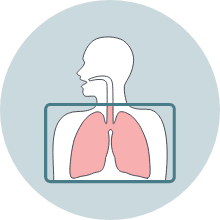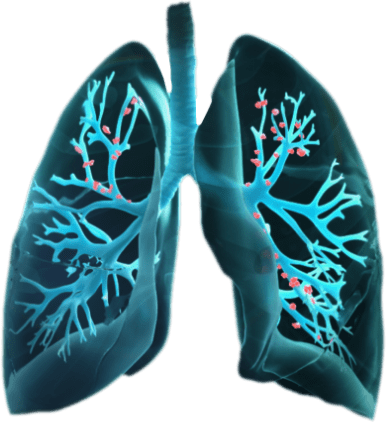Why Test for NTM ?

If you think you or a loved one may have NTM lung disease, there is something you can do. Talk to your doctor or a specialist about your symptoms and any lung conditions you have. Ask if getting tested for NTM lung disease may be right for you. The Doctor Discussion Guide below can help you ask the right questions.
It’s important to get tested for NTM lung disease because NTM—and its most common form, MAC lung disease—can worsen over time, causing more damage to your lungs. Your symptoms can get worse too.
Since the symptoms of NTM lung disease are similar to other lung conditions, diagnosis can be delayed. Many people who have NTM may not know it for months—or sometimes years. In fact, 2 out of 3 people with an NTM infection have moderate to severe NTM lung disease by the time they're diagnosed.
NTM lung disease causes damage to your lungs that will only get worse with time.
Explore the damaging effects

Getting tested is the first step to being properly diagnosed. The sooner you receive a diagnosis, the sooner you can begin to evaluate your treatment options with your doctor.
But starting the dialogue isn’t always easy. Visits may be short, and it can be difficult to remember everything you want to say at an appointment.

To prepare, use the Doctor Discussion Guide below to record the symptoms that you have been experiencing, your history of lung disease, medical history, and a list of the questions you have. Then, bring the discussion guide with you when you talk to your doctor.
Ask about NTM lung disease—Think you or a loved one may have NTM lung disease? Download this discussion guide to help start a conversation about NTM with your doctor.
Download Doctor
Discussion Guide
How
to test for NTM
To help determine if you have NTM lung disease,
your doctor may:
Perform a physical exam
Review your medical history—Your doctor will look at your health history and any lung conditions you currently have and the symptoms you are currently experiencing
Collect a sputum culture—Your doctor will ask you to cough up mucus, which they will analyze to look for bacteria. They may repeat this process for a correct diagnosis
Do a chest CT scan—Your doctor will use a specialized machine to take a picture of your body that shows any damage in your lungs
If you test positive for NTM lung disease, your doctor will decide what your next step is, including potential treatment options. You will need to continue seeing your doctor regularly so he or she can monitor your lungs.
Get An NTM Care Team
Diagnosing NTM lung disease can be difficult because the symptoms of NTM are common and can be mistaken for other lung conditions.
If you think you or a loved one has NTM lung disease, ask your doctor if you should be referred to a pulmonologist or an infectious disease (ID) specialist. Pulmonologists and ID specialists are more likely to be familiar with testing for and treating NTM lung disease.
You may want to consider finding a specialist who has experience caring for people with NTM lung disease. The disease can be difficult to manage, and some doctors may have limited NTM experience.
Pulmonologists
Doctors who focus on the
health of the lungs.
Infectious Disease Specialists
Doctors with special training in all kinds of infections, including those caused by bacteria, viruses, fungi, and parasites.
Diagnosing NTM lung disease can get you on the road to feeling better. Talking to a pulmonologist or an ID specialist about your symptoms is the first step.

